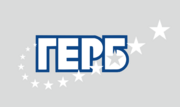GERB facts for kids
Quick facts for kids <div style="padding-top:0.3em; padding-bottom:0.3em; border-top:2px solid Lua error in Module:European_and_national_party_data/config at line 227: attempt to index field 'data' (a nil value).; border-bottom:2px solid Lua error in Module:European_and_national_party_data/config at line 227: attempt to index field 'data' (a nil value).; line-height: 1;">
Citizens for European Development of Bulgaria
Граждани за европейско развитие на България
|
|
|---|---|
 |
|
| Abbreviation | GERB |
| Chairman | Boyko Borisov |
| Deputy Chairmen | Tomislav Donchev Daniel Mitov |
| Founded | 3 December 2006 |
| Split from | National Movement Simeon II |
| Headquarters | Sofia |
| Membership (2018) | 94,000 |
| Ideology |
|
| Political position | Centre-right |
| National affiliation | GERB–SDS |
| European affiliation | European People's Party |
| International affiliation |
|
| European Parliament group | European People's Party Group |
| Colours | Blue |
| National Assembly | Lua error in Module:European_and_national_party_data/config at line 227: attempt to index field 'data' (a nil value). |
| European Parliament | Lua error in Module:European_and_national_party_data/config at line 227: attempt to index field 'data' (a nil value). |
| Municipalities |
99 / 265
|
| Party flag | |
 |
|
| Website | |
| Lua error in Module:European_and_national_party_data/config at line 227: attempt to index field 'data' (a nil value). | |
GERB, which stands for Citizens for European Development of Bulgaria (Bulgarian: Граждани за европейско развитие на България, romanized: Grazhdani za evropeysko razvitie na Bŭlgaria), is a major political party in Bulgaria. It is known for its conservative and populist ideas, meaning it often supports traditional values and aims to appeal to ordinary people. The party is considered centre-right in its political views. GERB has been a very important party in Bulgaria's government for many years. It was the ruling party from 2009-2013 and again from 2014-2021. More recently, it supported the Denkov government between 2023-2024 and formed the Zhelyazkov government in January 2025.
Contents
History of GERB
GERB was founded in 2006. It grew out of a non-profit group with the same name. The party is led by Boyko Borisov, who used to be the Prime Minister of Bulgaria and the mayor of Sofia.
Early Years and First Election Wins
In early 2007, GERB quickly became popular, ranking second in public polls. The party's main goals were to fight crime and corruption, support family values, and help Bulgaria become more energy independent.
GERB won its first big election in the 2009 European Parliament election in Bulgaria. They received 24.36% of the votes and sent five members to the European Parliament. They joined a group called the European People's Party Group. GERB officially became a member of the larger European People's Party in 2008.
A month later, in the 2009 parliamentary elections, GERB won again with 39.7% of the votes. This gave them 116 out of 240 seats in the parliament. After this win, Boyko Borisov became Prime Minister and formed his first government, mostly with GERB members. In the 2011 presidential election, GERB's candidates, Rosen Plevneliev and Margarita Popova, won the presidency with 52.6% of the votes.
Changes in Government and New Elections
On February 20, 2013, the government led by Borisov resigned after many protests across the country. Even though GERB was still the largest party after the 2013 parliamentary elections, they could not form a new government. They became an opposition party.
However, the next government also faced large protests and fell apart in 2014. This led to new elections. GERB returned to power after the snap elections that year. They formed a new government with other parties.
In the 2016 presidential election, GERB's candidates lost. After this, Borisov resigned again, and Bulgaria held new elections. In the 2017 parliamentary election, GERB came in first place once more. They formed their third government with other parties.
Recent Political Developments
In 2020, some members left GERB to form a new party. Throughout the second half of 2020, there were many protests against the GERB government, but Borisov stayed in power.
In the April 2021 parliamentary election, GERB was still the largest party, but they could not form a government. In the July 2021 snap election, GERB came in second place for the first time since the party was created. Later that year, in the November 2021 snap election, a new group called "We Continue the Change" won, and GERB became an opposition party.
After the 2022 election, no government was formed. In the 2023 election, GERB came first again. They formed a government with another group, but GERB had very few ministers. In March 2024, a plan to change the government leadership failed. GERB came first in both the June 2024 and October 2024 elections. In January 2025, GERB successfully formed the Zhelyazkov government with other parties.
Party Leadership
GERB has had important leaders since it was founded. Here are the people who have served as the party's chairman.
List of Chairmen
| No. | Name |
Portrait | Term of office | |
|---|---|---|---|---|
| 1 | Tsvetan Tsvetanov
(1965–) |
 |
3 December 2006 | 10 January 2010 |
| 2 | Boyko Borisov
(1959–) |
 |
10 January 2010 | Incumbent |
Parliamentary Leaders
These are the leaders of GERB in the National Assembly, Bulgaria's parliament.
| No. | Name |
Portrait | National Assembly | |
|---|---|---|---|---|
| 1 | Krasimir Velchev
(1951–) |
41st | ||
| 2 | Boyko Borisov
(1959–) |
 |
42nd | |
| 3 | Tsvetan Tsvetanov
(1965–) |
 |
43rd | |
| 4 | Daniela Daritkova
(1966–) |
44th | ||
| 5 | Desislava Atanasova
(1978–) |
 |
45th | |
| 46th | ||||
| 47th | ||||
| 48th | ||||
| 49th | ||||
| 6 | Boyko Borisov
(1959–) |
 |
49th | |
Election Results Overview
GERB has participated in many elections in Bulgaria and for the European Parliament. The tables below show how the party has performed in these elections, including the number of votes they received and how many seats they won.
National Assembly Elections
These results show how GERB performed in elections for the Bulgarian National Assembly (parliament).
| Election | Votes | % | Seats | +/– | Status |
|---|---|---|---|---|---|
| 2009 | 1,678,583 | 39.72 (#1) |
116 / 240
|
New | Minority |
| 2013 | 1,081,605 | 30.55 (#1) | Opposition | ||
| 2014 | 1,072,491 | 32.67 (#1) |
84 / 240
|
Coalition | |
| 2017 | 1,147,283 | 32.65 (#1) |
95 / 240
|
Coalition | |
| Apr 2021 | 837,707 | 25.80 (#1) |
73 / 240
|
Snap election | |
| Jul 2021 | 642,165 | 23.21 (#2) |
63 / 240
|
Snap election | |
| Nov 2021 | 596,456 | 22.44 (#2) |
59 / 240
|
Opposition | |
| 2022 | 634,627 | 24.48 (#1) |
67 / 240
|
Snap election | |
| 2023 | 669,924 | 25.39 (#1) |
69 / 240
|
Coalition | |
| Jun 2024 | 530,658 | 23.99 (#1) |
68 / 240
|
Snap election | |
| Oct 2024 | 642,521 | 25.52 (#1) |
66 / 240
|
Coalition |
Presidential Elections
These results show how GERB's candidates performed in elections for the President of Bulgaria.
| Election | Candidate | First round | Second round | ||||
|---|---|---|---|---|---|---|---|
| Votes | % | Rank | Votes | % | Result | ||
| 2011 | Rosen Plevneliev | 1,349,380 | 40.1 | 1st | 1,698,136 | 52.6 | Won |
| 2016 | Tsetska Tsacheva | 840,635 | 22.0 | 2nd | 1,256,485 | 36.2 | Lost |
| 2021 | Anastas Gerdzhikov | 610,862 | 22.8 | 2nd | 733,791 | 31.8 | Lost |
European Parliament Elections
These results show how GERB performed in elections for the European Parliament.
| Election | List leader | Votes | % | Seats | +/– | EP Group |
|---|---|---|---|---|---|---|
| 2007 | Dushana Zdravkova | 420,001 | 21.68 (#1) |
5 / 18
|
New | EPP-ED |
| 2009 | Rumiana Jeleva | 627,693 | 24.36 (#1) |
5 / 18
|
EPP | |
| 2014 | Tomislav Donchev | 680,838 | 30.40 (#1) |
6 / 17
|
||
| 2019 | Mariya Gabriel | 607,194 | 30.13 (#1) |
6 / 17
|
||
| 2024 | Rosen Zhelyazkov | 474,059 | 23.55 (#1) |
5 / 17
|
See also
 In Spanish: Ciudadanos por el Desarrollo Europeo de Bulgaria para niños
In Spanish: Ciudadanos por el Desarrollo Europeo de Bulgaria para niños
 | John T. Biggers |
 | Thomas Blackshear |
 | Mark Bradford |
 | Beverly Buchanan |



